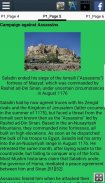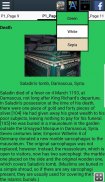








Biography of Salahuddin Ayyubi

คำอธิบายของBiography of Salahuddin Ayyubi
Ṣalāḥ ad-Dīn Yūsuf ibn Ayyūb (Arabic: صلاح الدين يوسف بن أيوب, Kurdish: سەلاحەدینی ئەییووبی or Selahedînê Eyûbî) (1137/1138 – March 1193), better known in the Western world as Saladin, was the first Sultan of Egypt and Syria and the founder of the Ayyubid dynasty. A Muslim of Kurdish origin, Saladin led the Muslim opposition to the European Crusaders in the Levant. At the height of his power, his sultanate included Egypt, Syria, Mesopotamia, Hejaz, Yemen and other parts of North Africa.
Originally sent to Fatimid Egypt by his Zengid lord Nur ad-Din in 1163, Saladin climbed the ranks of the Fatimid government by virtue of his military successes against Crusader assaults on its territory and his personal closeness to the caliph al-Adid. When Saladin's uncle Shirkuh died in 1169, al-Adid appointed Saladin vizier, a rare nomination of a Sunni Muslim to such an important position in the Shia Muslim-led caliphate. During his term as vizier Saladin began to undermine the Fatimid establishment, and following al-Adid's death in 1171 he took over the government and realigned the country's allegiance with the Baghdad-based Abbasid Caliphate. In the following years, he led forays against the Crusaders in Palestine, ordered the successful conquest of Yemen and staved off pro-Fatimid rebellions in Upper Egypt.
Not long after the death of Nur ad-Din in 1174, Saladin personally led the conquest of Syria, peacefully entering Damascus at the request of its governor. By mid-1175, Saladin had conquered Hama and Homs, inviting the animosity of his former Zengid lords, who had been the official rulers of Syria. Soon after, he defeated the Zengid army in battle and was thereafter proclaimed the "Sultan of Egypt and Syria" by the Abbasid caliph al-Mustadi. He made further conquests in northern Syria and Jazira, escaping two attempts on his life by the Assassins, before returning to Egypt in 1177 to address issues there. By 1182, Saladin completed the conquest of Syria after capturing Aleppo, but ultimately failed to take over the Zengid stronghold of Mosul.
Under Saladin's personal leadership, the Ayyubid army defeated the Crusaders at the decisive Battle of Hattin in 1187, leading the way to the Muslims' re-capture of Palestine from the Crusaders who had conquered it 88 years earlier. Though the Crusader Kingdom of Jerusalem would continue to exist for an extended period, its defeat at Hattin marked a turning point in its conflict with the Muslim powers of the region. In 1193 he died in Damascus, having given much of his wealth to his subjects. He is buried in a mausoleum adjacent to the Umayyad Mosque. Saladin has become a prominent figure in Muslim, Arab, Turkish and Kurdish culture.
App Feature :
-Have 7 avalaible language English,Arab,Indon,Malay,French,Benggali,Russia and Turkish
Salah โฆษณาDīnยูซุฟอิบัน Ayyub (อาหรับ: صلاحالدينيوسفبنأيوبดิช: سەلاحەدینیئەییووبیหรือSelahedînêEyûbî) (1137/1138 - มีนาคม 1193) ที่รู้จักกันดีในโลกตะวันตกเป็น Saladin เป็นสุลต่านแรกของอียิปต์ และซีเรียและผู้ก่อตั้งราชวงศ์ Ayyubid มุสลิมต้นกำเนิดของชาวเคิร์ดศอลาฮุดนำฝ่ายค้านชาวมุสลิมที่จะแซ็กซอนยุโรปในลิแวนต์ ที่ระดับความสูงของการใช้พลังงานของเขาสุลต่านของเขารวมถึงอียิปต์ซีเรียโสโปเตเมีย, จ๊าซ, เยเมนและส่วนอื่น ๆ ของแอฟริกาเหนือ
ส่งมาเพื่อฟาติมิดอียิปต์โดยเจ้านายของเขา Zengid Nur โฆษณาดินแดงใน 1163, Saladin ปีนขึ้นการจัดอันดับของรัฐบาลฟาติมิดโดยอาศัยอำนาจตามความสำเร็จของเขากับทหารข่มขืนสงครามในดินแดนของตนและความใกล้ชิดส่วนตัวของเขาที่จะกาหลิบอัล Adid เมื่อลุงของศอลาฮุด Shirkuh เสียชีวิตในปี 1169 อัล Adid ได้รับการแต่งตั้งศอลาฮุดราชมนตรี, การแต่งตั้งให้เป็นที่หายากของชาวมุสลิมสุหนี่เช่นตำแหน่งที่สำคัญในชิหัวหน้าศาสนาอิสลามมุสลิมนำ ระหว่างที่เขาดำรงราชมนตรี Saladin เริ่มที่จะบ่อนทำลายการจัดตั้งฟาติมิดและหลังการตายของอัล Adid ใน 1171 เขาเข้ามารัฐบาลและตั้งหลักจงรักภักดีของประเทศกับกรุงแบกแดดที่ใช้ซิตหัวหน้าศาสนาอิสลาม ในปีต่อไปนี้เขานำจู่โจมกับแซ็กซอนในปาเลสไตน์สั่งพิชิตความสำเร็จในเยเมนและทะลุออกกบฏโปรฟาติมิดในสังคมอียิปต์
ไม่นานหลังจากการตายของนูร์ดินโฆษณาใน 1174, Saladin เองนำไปสู่ชัยชนะของซีเรียเข้าสู่ดามัสกัสอย่างสงบตามคำร้องขอของผู้ว่าราชการจังหวัดของตน โดยกลางเดือน 1175 ศอลาฮุดเอาชนะ Hama Homs และเชิญความเกลียดชังของเจ้านายของเขาอดีต Zengid ที่ได้รับการปกครองอย่างเป็นทางการของซีเรีย ไม่นานหลังจากที่เขาแพ้กองทัพ Zengid ในการต่อสู้และได้รับการประกาศหลังจากนั้น "สุลต่านแห่งอียิปต์และซีเรีย" โดยซิตกาหลิบอัล Mustadi เขาทำต่อพ่วงในภาคเหนือของซีเรียและ Jazira หนีสองครั้งในชีวิตของเขาโดยการสังหารก่อนที่จะกลับไปยังอียิปต์ใน 1177 เพื่อแก้ไขปัญหาที่มี โดย 1182, Saladin เสร็จพิชิตซีเรียหลังจากที่จับอาเลปโป แต่ล้มเหลวในที่สุดจะใช้เวลามากกว่าที่มั่น Zengid ซูล
ภายใต้การนำของศอลาฮุดส่วนตัวกองทัพ Ayyubid แพ้แซ็กซอนที่รบแตกหักของแฮใน 1187 นำวิธีการไปยังชาวมุสลิมจับภาพใหม่ของปาเลสไตน์จากแซ็กซอนที่เคยเอาชนะมัน 88 ปีก่อนหน้านี้ แม้ว่าสงครามราชอาณาจักรเยรูซาเล็มจะยังคงมีอยู่เป็นระยะเวลานานความพ่ายแพ้ที่แฮเป็นจุดเปลี่ยนในความขัดแย้งกับอำนาจของชาวมุสลิมในภูมิภาค ใน 1193 เขาเสียชีวิตในดามัสกัสมีให้มากเพื่อความมั่งคั่งของเขาเรื่องของเขา เขาถูกฝังในสุสานที่อยู่ติดกับมัสยิดเมยยาด ศอลาฮุดได้กลายเป็นร่างที่โดดเด่นในมุสลิมอาหรับวัฒนธรรมตุรกีและชาวเคิร์ด
คุณสมบัติ App:
-Have 7 ภาษาอังกฤษ avalaible อาหรับ Indon, มาเลย์, ฝรั่งเศส, Benggali รัสเซียและตุรกี


























